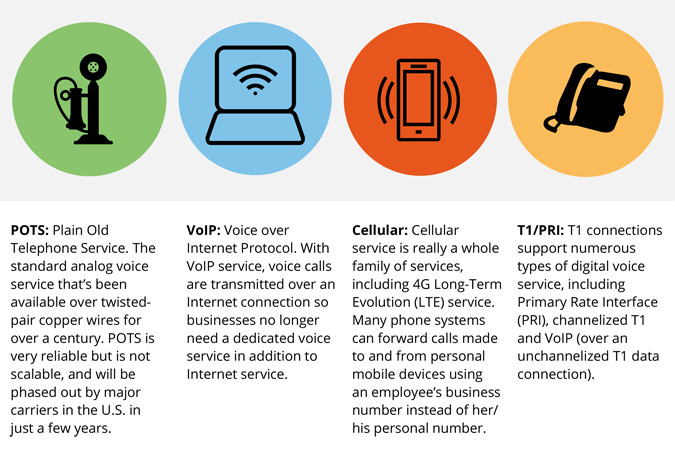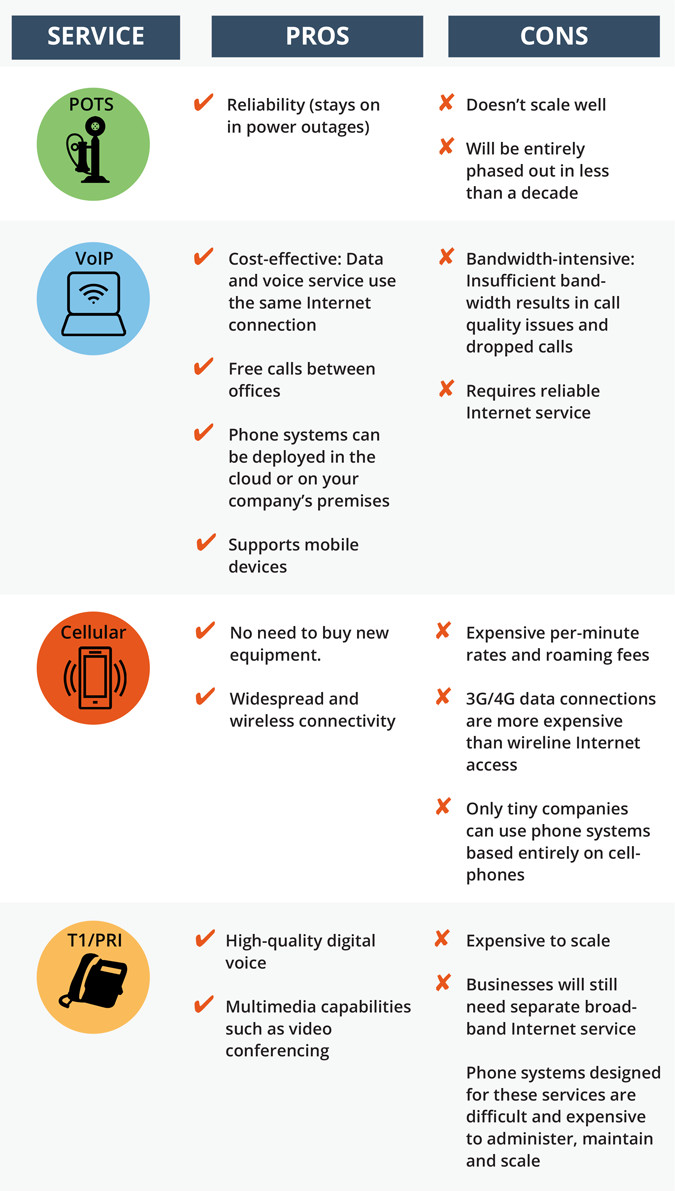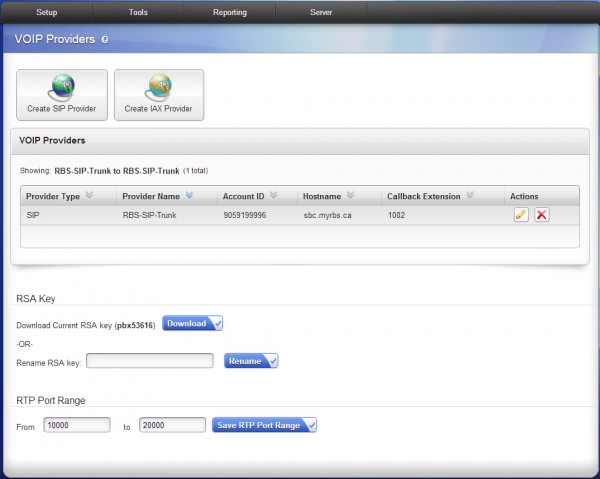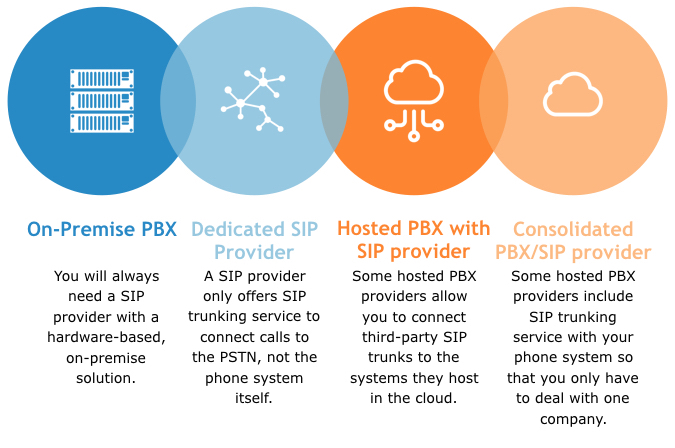Find the best Business Phone Service Providers
Compare Products
Showing 1 - 20 of 144 products
Sort by
Reviews: Sorts listings by the number of user reviews we have published, greatest to least.
Sponsored: Sorts listings by software vendors running active bidding campaigns, from the highest to lowest bid. Vendors who have paid for placement have a ‘Visit Website’ button, whereas unpaid vendors have a ‘Learn More’ button.
Avg Rating: Sorts listings by overall star rating based on user reviews, highest to lowest.
A to Z: Sorts listings by product name from A to Z.
RingCentral MVP
RingCentral MVP
RingEX is a cloud-based business communications solution that offers tools for Messaging, Video and Phone. Core features of the solution include conferencing, auto-recording and unlimited long-distance and local calling. RingEX ...Read more about RingCentral MVP
Ooma Office
Ooma Office
Ooma Office is a cloud-based voice + video solution suitable for businesses of all sizes. The platform includes a full suite of business phone features designed to deliver a flawless communications experience and advance team coll...Read more about Ooma Office
Dialpad
Dialpad
Dialpad is an AI-powered cloud communication platform and business phone system that provides organizations with the latest in VoIP telephony technology to keep teams connected and productive. The platform comprises three integrat...Read more about Dialpad
Nextiva
Nextiva
Nextiva brings customers and teams closer by connecting conversations in one AI-powered platform. We connect businesses to all of their conversations, helping them understand their customers in real-time to create personalized exp...Read more about Nextiva
Talk with us for a free
15-minute consultationSoftware Advice is free because vendors pay us when they receive sales opportunities.
This allows us to provide comprehensive software lists and an advisor service at no cost to you.
This allows us to provide comprehensive software lists and an advisor service at no cost to you.
Meet Eric, a software expert who has helped 1,534 companies select the right product for their needs.
Talk with us for a free
15-minute consultationSoftware Advice is free because vendors pay us when they receive sales opportunities.
This allows us to provide comprehensive software lists and an advisor service at no cost to you.
This allows us to provide comprehensive software lists and an advisor service at no cost to you.
Tell us more about your business and an advisor will reach out with a list of software recommendations customized for your specific needs.
STEP 1 OF 4
How many phones do you have?
OnSIP
OnSIP
OnSIP Hosted OnSIP Hosted VoIP by Junction Networks is a cloud-based phone solution that offers businesses across various industry verticals PBX feature such as auto attendants and voicemail-to-email. Unified communications (...Read more about OnSIP
ULTATEL Cloud Business Phone System
ULTATEL Cloud Business Phone System
ULTATEL enables people to work together and get the information they need to do their best work, anywhere they are. Our cloud platform brings together phone, video, messaging, texts and business apps, allowing people to connect, ...Read more about ULTATEL Cloud Business Phone System
DialedIn CCaaS
DialedIn CCaaS
DialedIn (formerly ChaseData) offers cloud-based, standalone call center functionality with customer service and support built into the solution. It’s designed for outbound, inbound and blended call center teams. Dialing capabil...Read more about DialedIn CCaaS
Bitrix24
Bitrix24
Bitrix24 is an online workspace for small, medium, and large businesses. It features over 35 cross-integrated tools, including CRM, tasks, Kanban board, Gantt chart, messenger, video calls, file storage, workflow automation, and m...Read more about Bitrix24
VoIP.ms
VoIP.ms
VoIP.ms is a cloud-based internet phone service solution designed to help businesses manage local, mobile and toll-free number portability across Canada and United States. Key features include voicemail, call waiting, caller ID, D...Read more about VoIP.ms
GoTo Connect
GoTo Connect
GoTo Connect is the all-in-one phone, meeting and messaging software built for SMBs. It boasts an enterprise-class phone system with 100+ features with inclusive minutes for local, long distance & international calls; video and au...Read more about GoTo Connect
Weave
Weave
Weave is the all-in-one customer communication and engagement platform for small- and medium-sized businesses. From the first phone call to the final invoice and every touchpoint in between, Weave connects the entire customer jour...Read more about Weave
Twilio
Twilio
Twilio is the worlds leading cloud communications platform that enables businesses to build, scale, and operate their own customized communication solutions. The platform is designed to be customizable and easy to use, which means...Read more about Twilio
Aircall
Aircall
Aircall is a cloud-based business phone and call center system that helps manage and streamline customer support and sales engagement operations. Designed for offices and teams in remote areas, it enables users to integrate the so...Read more about Aircall
3CX
3CX
3CX Phone System is an open standards communications solution, suitable for any sized business that wants all the features of an advanced contact center at a fraction of the cost. 3CX can take your business communications to the n...Read more about 3CX
Ringover
Ringover
Ringover is the no.1 business phone system that gives you unlimited calls to 110 countries, video conferencing, SMS and group messaging, call recording, call whispering and more features focused on improving your teams productivit...Read more about Ringover
Grasshopper
Grasshopper
Grasshopper is a cloud-based virtual phone service that helps small to midsize enterprises establish communication with customers through local and toll-free numbers. It provides several modules, including call forwarding, multipl...Read more about Grasshopper
MiVoice Business Solution
MiVoice Business Solution
MiCloud Connect (formerly ShoreTel) is a cloud-based VoIP phone system that offers collaboration and conferencing tools to enable information flow within the organization. The solution enables system administrators to manage use...Read more about MiVoice Business Solution
Kixie PowerCall
Kixie PowerCall
Welcome to Kixie, the sales engagement platform that revolutionizes the way you do business. Designed to supercharge your sales performance, Kixie offers ultra-reliable and easily automated calling and texting features that seamle...Read more about Kixie PowerCall
8x8 Work
8x8 Work
Experience seamless collaboration with 8x8 Work. 8x8 Work is an all-in-one collaboration hub for phone, video, and messaging. It brings robust and secure unified communication and collaboration experiences to every employee, with...Read more about 8x8 Work
CloudTalk
CloudTalk
CloudTalk is a contact center management solution that enables businesses to streamline communications with teams and customers using virtual call systems. It allows executives to manage inbound/outbound calls, extract interaction...Read more about CloudTalk
Popular Comparisons
Buyers Guide
Last Updated: March 16, 2023Who are business phone service providers?
Business phone service providers help businesses manage phone calls. They offer the service via Voice over Internet Protocol (VoIP), Plain Old Telephone Service (POTS), cellular network, and Primary Rate Interface (PRI), based on a client’s preference. The service includes routing inbound calls, managing voicemail, forwarding calls, managing caller ID, and recording calls.
Clients can use this service to make phone calls within and outside the organization for purposes such as providing customer support, managing sales calls, and communicating with vendors.
Business phone service has transformed dramatically over recent decades—so it’s critical to know your options if you’re thinking about switching providers or replacing your phone system.
Recent changes in carriers’ offerings have mainly been driven by the evolution of Voice over Internet Protocol (VoIP) technology. VoIP makes it possible to send phone calls over the Internet, as opposed to traditional phone lines.
VoIP service is technically complex, so you’ll need to understand the key elements of a solution before you begin evaluating providers. Additionally, there are reasons to explore other types of phone service besides VoIP even though most businesses are now migrating to VoIP service when they need a new system.
We’ve written this buyer’s guide to familiarize you with the major kinds of business phone service on the market today. Here are the topics we’ll explore:
Phone Service Types: POTS, VoIP, Cellular and PRI
Pros and Cons of Different Service Types
Finding the Right Service Type for Your Phone System
The Difference between SIP Trunking Service and Business VoIP Phone Service
Phone Service Types: POTS, VoIP, Cellular and PRI
The following graphic breaks down the basic types of voice service available in North America:
Voice Service Types

POTS offers one unique advantage over other kinds of voice service: POTS transmits voice information as an analog audio signal using electricity, so POTS lines supply power to both phones and voice service. This means that POTS will keep phones ringing even if the power gets knocked out.
That said, the FCC is currently overseeing the sunset of the traditional copper telephone network. If you’re currently using POTS, you need to be aware that copper phone lines will be dead for good in just a few more years.
VoIP is a technology that transmits real-time voice information as data using an Internet connection.
VoIP differs from other digital voice services in that the voice information isn’t just digitized, but also transmitted using Internet Protocol (IP). This means you can use broadband Internet access for both voice and data. Other kinds of digital voice service businesses need both Internet and voice service.
VoIP can be used with various types of Internet access, including:
Broadband cable
DSL
Fiber optic
T1
You just need sufficient bandwidth for the calls. Just like streaming video, VoIP demands lots of bandwidth, as calls are streamed in real-time.
Cellular service only supported voice calling at one point, but it now refers to a family of services that also enable wireless data connections to the Internet.
On a smartphone, a voice call can be routed via the cellular carrier, which will rack up per-minute rates. However, the call can also be sent over a long-term evolution (LTE) data connection, so you only pay for the data used by the call—no per-minute rates.
This is a variation on VoIP known as Voice over LTE, or VoLTE. (While LTE refers specifically to 4G networks, a 3G or wireless Internet connection can also be used.)
Finally, T1 connections support a whole family of digital voice services:
Primary Rate Interface (PRI) service is a specialized type of digital voice service that’s been available since the 1980s. With PRI, a T1 trunk line is divided into 24 channels, 23 of which can be used for voice calls. The 24th channel is utilized for signalling information like caller ID. While PRI has been in use in enterprise contact centers for decades, the technology has limitations when it comes to scalability. In particular, because only 23 channels are available for voice calls, a business will need to buy a whole new trunk line with another 23 channels for calls in order to handle 24 calls at once. This means that you’re essentially paying for unused capacity. VoIP, on the other hand, is much more scalable and affordable in North America. (There are regional cases to be made for using PRI in other countries.)
Channelized T1 is a T1 trunk divided into 24 channels for voice calls. With channelized T1, there’s no separate channel for signalling information as there is with PRI, which means the service can’t support essential capabilities, such as caller ID.
Unchannelized T1 is just that: a trunk line that hasn’t been divided into channels. Unchannelized T1 is used for data service, whereas PRI and channelized T1 are used for voice service. An unchannelized T1 connection can support VoIP service.
Pros and Cons of Different Service Types
The table below summarizes the advantages and disadvantages of each service type:

Finding the Right Service Type and Provider for Your Phone System
There are two basic elements of a communications solution: the hardware- or software-based phone system (also known as a Private Branch eXchange or PBX system), and the phone service that allows you to make and receive calls.
Contemporary phone systems can be based on hardware or software deployed at your company, on-premise, or they can be hosted in the cloud.
Some businesses don’t even have desk phones—just softphone applications installed on laptops that connect via the Internet to a phone system in the service provider’s data center.
VoIP-based systems are particularly flexible in this respect.
The table below shows the major phone system types and the voice services they work with. Definitions of each system can be found below the table:
System Type | POTS | PRI | VoIP | Cellular |
Traditional PBX | ✓ | ✓ |
|
|
Cloud-based or on-premise IP PBX |
|
| ✓ | ✓ |
Hybrid PBX | ✓ | ✓ | ✓ | ✓ |
Virtual PBX |
|
|
| ✓ |
A traditional PBX is a system designed either for analog voice service or PRI service (in addition to other types of digital voice service based on time-division multiplexing, which is the fundamental technology behind PRI service).
An Internet Protocol PBX or IP PBX is a system designed specifically for VoIP service. An IP PBX can be deployed on your business’s premises or in the cloud.
A hybrid PBX is a system that can handle both VoIP service and traditional analog and digital voice services.
A virtual PBX is a stripped-down hosted phone system designed for very small businesses that primarily want to use employees’ personal cell phones for business communications. No hardware or software is deployed at the business’s premises. Instead, employees get special work phone numbers. When a call is made to one of these work numbers, the virtual PBX provider forwards it to the employee’s personal mobile device.
Similarly, employees can call out from their mobile devices using their work numbers, though some virtual PBX solutions have limits when it comes to outbound dialing; others treat it as an add-on capability. Virtual PBX solutions also offer a very limited set of basic phone system features like auto attendants.
The Difference Between SIP Trunking Service and Business VoIP Phone Service
As we’ve explained, calls between offices are free with business VoIP service because they don’t have to travel over the traditional phone network (known as the Public Switched Telephone Network or PSTN). This is also why services such as Skype offer free voice and video calls, but only to other Skype users.
In order to connect calls between VoIP numbers and numbers serviced by the PSTN in this country or internationally, you need a special service known as SIP trunking. SIP trunking is a complex network service, but it essentially acts as a bridge across which voice calls can travel between the Internet and the PSTN.
Confusingly, the term “VoIP service” can refer either to the delivery of phone system functions (call routing, voicemail, call recording etc.) over the Internet with a cloud-based PBX, or to SIP trunking service.
With an on-premise IP PBX, you’ll need a SIP trunking provider to connect calls, unless you’re planning to restrict communications to calls between offices.

Configuring SIP providers in Digium Switchvox
With a cloud-based PBX, you may or may not need a separate SIP provider.
Many cloud PBX vendors handle SIP trunking for their customers via their relationships with major carriers. This means that you only need to deal with one company for both your phone system and SIP trunking needs.
On the other hand, some businesses choose to go with separate companies: one for the phone system and one for SIP trunking. This setup makes sense if your SIP provider is offering you particularly good rates on calls, or if you’ve had good experiences with the providers’ uptime and quality of support.
You can connect SIP trunks from various providers to a phone system hosted in the cloud, just as you can with a phone system on your business’s premises.
Whether you have a cloud-based or on-premise IP PBX, you’ll need to make sure that your SIP trunking provider is compatible with your phone system (unless, of course, the same company is handling your hosted system and your SIP trunking).
The graphic below shows the different ways in which SIP trunking can be combined with VoIP systems:
Different SIP Trunking Setups with IP PBX Systems








